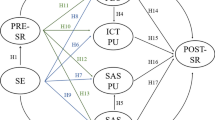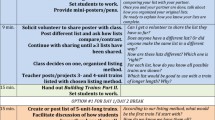Abstract
Employer expectations have changed: university students are expected to graduate with computer competencies appropriate for their field. Educators are also harnessing technology as a medium for learning in the belief that information and communication technologies (ICT’s) can enliven and motivate learning across a wide range of disciplines. Alongside developing students’ computer skills and introducing them to the use of professional software, educators are also harnessing professional and scientific packages for learning in some disciplines. As the educational use of information and communication technologies increases dramatically, questions arise about the effects on learners. While the use of computers for delivery, support, and communication, is generally easy and unthreatening, higher-level use may pose a barrier to learning for those who lack confidence or experience. Computer confidence may mediate in how well students perform in learning environments that require interaction with computers. This paper examines the role played by computer confidence (or computer self-efficacy) in a technology-enriched science and engineering mathematics course in an Australian university. Findings revealed that careful and appropriate use of professional software did indeed enliven learning for the majority of students. However, computer confidence occupied a very different dimension to mathematics confidence: and was not a predictor of achievement in the mathematics tasks, not even those requiring use of technology. Moreover, despite careful and nurturing support for use of the software, students with low computer confidence levels felt threatened and disadvantaged by computer laboratory tasks. The educational implications of these findings are discussed with regard to teaching and assessment, in particular. The TCAT scales used to measure technology attitudes, computer confidence/self-efficacy and mathematics confidence are included in an Appendix. Well-established, reliable, internally consistent, they may be useful to other researchers. The development of the computer confidence scale is outlined, and guidelines are offered for the design of other discipline-specific confidence/self-efficacy scales appropriate for use alongside the computer confidence scale.
Similar content being viewed by others
References
Bandura, A. (1977). Self-efficacy: Toward a unifying theory of behavioral change. Psychological Review, 84, 191–215.
Bandura, A. (Ed.) (1995). Self-efficacy in changing societies. New York: Cambridge University Press.
Bandura, A. (1997). Self-efficacy: The exercise of control. New York: Freeman.
Cretchley, P., & Galbraith, P. (2002). Mathematics or computers? Confidence or motivation? In Proceedings of ICTM2, the 2nd International Conference on the Teaching of Mathematics (Undergraduate). Online and CD. Wiley, Crete.
Cretchley, P., & Harman, C. (2001). Balancing the scales of confidence — Computers in early undergraduate mathematics learning. In Quaestiones Mathematicae, Suppl. 1, 17–25.
Cretchley, P., Harman, C., Ellerton, N., & Fogarty, G. (2000). MATLAB in early undergraduate mathematics: An investigation into the effects of scientific software on learning. Mathematics Education Research Journal, 12(3), 219–233.
Fogarty, G., Cretchley, P., Harman, C., Ellerton, N., & Konki, N. (2001). Validation of a questionnaire to measure mathematics confidence, computer confidence, and attitudes towards the use of technology for learning mathematics. Mathematics Education Research Journal, 13(2), 154–159.
Galbraith, P., & Haines, C. (2000). Mathematics-computing attitude scales. Monographs in continuing education. London: City University.
Galbraith, P., Pemberton, M., & Cretchley, P. (2001). Computers and undergraduate mathematics: What is going on? In J. Bobis, R. Perry, & M. Mitchelmore (Eds.), Numeracy and beyond: Proceedings of the twenty-fourth annual conference of the Mathematics Education Research Group of Australasia (pp. 233–240). Sydney: MERGA.
Goos, M., & Cretchley, P. (2004). Computers and the internet in mathematics education. Research in Mathematics Education in Australasia 2000–2003 (pp. 151–174). Flaxton: Post Pressed.
Maddux, J. (Ed.) (1995). Self-efficacy, adaptation, and adjustment: Theory, research, and application. New York: Plenum.
Schwarzer, R. (Ed.) (1992). Self-efficacy: Thought control of action. Washington, DC: Hemisphere.
Tartre, L. A., & Fennema, E. (1995). Mathematics achievement and gender: A longitudinal study of selected cognitive and affective variables (Grades 6–12). Educational Studies in Mathematics, 28, 199–217.
Author information
Authors and Affiliations
Corresponding author
Appendix: TCAT Technology Confidence and Attitude Scales
Appendix: TCAT Technology Confidence and Attitude Scales
The Education/Psychology/Mathematics Research Team comprising P. Cretchley, G. Fogarty, C. Harman & N. Ellerton gratefully acknowledge support from a USQ Project Team Grant towards the development of these scales.
1.1 TCAT instrument for measuring Mathematics Confidence:
I have less trouble learning mathematics than other subjects.
When I have difficulties with maths, I know I can handle them.
I do not have a mathematical mind. R
It takes me longer to understand maths than the average person. R
I have never felt myself able to learn mathematics. R
I enjoy trying to solve new mathematics problems.
I find mathematics frightening. R
I find many mathematics problems interesting and challenging.
I don’t understand how some people seem to enjoy spending so much time on maths problems. R
I have never been very excited about mathematics. R
I find mathematics confusing. R
1.2 TCAT Instrument for measuring Computer Confidence:
I have less trouble learning how to use a computer than I do learning other things.
When I have difficulties using a computer, I know I can handle them.
I am not what I would call a computer person.
It takes me longer to understand computers than the average person.
I have never felt myself able to learn how to use computers.
I enjoy trying new things on a computer.
I find having to use computers frightening.
I find many aspects of using computers interesting and challenging.
I don’t understand how some people seem to enjoy so much time at a computer.
I have never been very excited about computers.
I find using computers confusing.
1.3 TCAT instrument for measuring Attitudes to using Technology when doing and learning mathematics:
Computing power makes it easier to explore mathematical ideas.
I know computers are important but I don’t feel I need to use them to learn mathematics.
Computers and graphics calculators are good tools for calculation, but not for my learning of mathematics.
Using technology is too new and strange to make it worthwhile for learning mathematics.
Using technology wastes too much time in the learning of maths.
I prefer to do all the calculations & graphing myself, without using a computer or graphics calculator.
Using technology for the calculations makes it easier for me to do more realistic applications.
I like the idea of exploring mathematical methods and ideas using technology.
I want to get better at using computers to help me with mathematics.
The symbols and language of mathematics are bad enough already without the addition of technology.
Having technology to do routine work makes me more likely to try different methods and approaches.
Rights and permissions
About this article
Cite this article
Cretchley, P. Does computer confidence relate to levels of achievement in ICT-enriched learning models?. Educ Inf Technol 12, 29–39 (2007). https://doi.org/10.1007/s10639-006-9004-6
Published:
Issue Date:
DOI: https://doi.org/10.1007/s10639-006-9004-6




